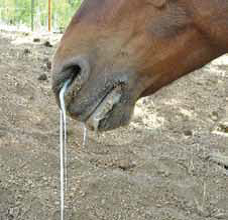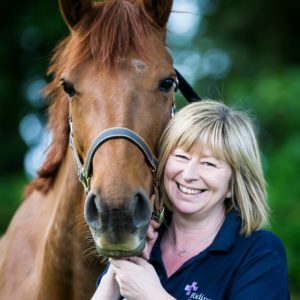We regularly see horses with choke - including a couple recently, so here is some information for anyone who wants to know more!
What is choke?
Choke is any condition - usually a blockage - that stops food and saliva passing down your horses oesophagus. The oesophagus is the tube that takes food from the back of the throat to the stomach.
Choke does not stop your horse breathing as it does not obstruct the trachea (windpipe).
What causes choke?
Choke is caused by swallowing food that is either too dry, not chewed enough or that expands rapidly like unsoaked sugar beet. It can be seen when horses are greedy or rushed and swallow without chewing.
There are also several conditions that can cause choke such as dental problems, grass sickness and trauma. We also see this condition in horses that eat when they are still sedated and do not chew their food before swallowing.
Symptoms:
- The most obvious sign is saliva passing back out of your horses nose +/- mouth - they cannot swallow properly so saliva when attempting to swallow will often come back up the nose. Food may also be present in this saliva if your horse continues eating or from the blockage.
- Exagerated swallowing efforts when your horse tenses their neck and sometimes squeal, occasionally horses may become distressed, roll and show colic like symptoms.
- Coughing, gagging, dtanding with head and neck extended.
- Some chokes have a lump visible or to touch where the blockage sits - this is on the left side of the neck just above their windpipe.
- If choking for a long time horses will become dull and dehydrated
- and severe infection of the lungs can occur due to inhaled saliva / food.
- Damage can happen to the oesophagus for longer term chokes.
- Choke could be confused with: bad coughs, dental pain, neck pain, severe colics which are refluxing stomach contents (these are strong smelling).
Treatment:
- Remove all feed from your horses stable.
- Many choke episodes can clear themselves - saliva can soften and lubricate the blockage and some cases will clear on their own.
- Do not attempt to syringe water and never attempt to syringe oils or lubricants into your horse - they cannot swallow and if inhaled this can cause severe damage to your horses lungs.
- We will be likely to sedate your horse - as a lower head will reduce the risk of your horse inhaling the saliva and calm your horse.
- We may give an injection to relax contraction of the muscles in the oesophagus to help passage of the blockage.
- We will pass a stomach tube into the oesophagus - this allows us to check where the blockage is, and sometimes passing the tube can clear the obstruction.
- In cases which are not clearing we will consider flushing the blockage with warm fluids - this can take time and requires heavy sedation to keep your horses head low reducing the risk of inhaling the fluids - which can be fatal.
- Occasionally further treatment is required such as a general anaesthetic in very difficult horses, passing an endoscope if the blockage is not passing, or further medical investigations.
Preventing Choke
- All horses should ideally have dry feed soaked according to instructions, or dampened even if soaking is not required.
- Access to clean water.
- Regular dental care will help prevent pain stopping your horse chewing properly.
- In horses with few or poor quality teeth a change of diet may be required to food more easily chewed.
Please speak to us if you require any advice, and call for urgent veterinary attention if you think your horse may be choking.

